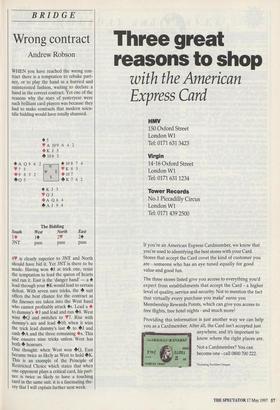BRIDGE
Wrong contract
Andrew Robson
WHEN you have reached the wrong con- tract there is a temptation to rebuke part- ner, or to play the hand in a hurried and uninterested fashion, waiting to declare a hand in the correct contract. Yet one of the reasons why the stars of yesteryear were such brilliant card players was because they had to make contracts that modern scien- tific bidding would have totally shunned.
The Bidding South West North East
1♦ 14 2V 24 3NT pass pass pass 4V is clearly superior to 3NT and North should have bid it. Yet 3NT is there to be made. Having won 4J at trick one, resist the temptation to lead the queen of hearts and run it. East is the 'danger hand' — a 4 lead through your 4K would lead to certain defeat. With seven sure tricks, the + suit offers the best chance for the contract as the finesses are taken into the West hand who cannot profitably attack 4s. Lead a • to dummy's ♦J and lead and run +8. West wins +0 and switches to V7. Rise with dummy's ace and lead 410; when it wins the trick lead dummy's last + to +J and cash 4A and the three remaining ♦s. This line ensures nine tricks unless West has both # honours.
One thought: when West won +0, East became twice as likely as West to hold +K. This is an example of the Principle of Restricted Choice which states that when one opponent plays a critical card, his part- ner is twice as likely to have a touching card in the same suit. it is a fascinating the- ory that I will explain further next week.


































































 Previous page
Previous page